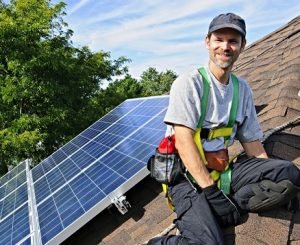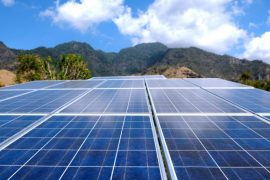11 Advantages and 9 Disadvantages of Solar Energy
solar energy advantages and disadvantages. Solar panels are extremely popular, but the question may arise whether everything is that positive? Why people are increasingly opting for this sustainable form of energy generation, certainly has to do with the following benefits associated with solar energy and the use of solar panels.
Discover the advantages and disadvantages of solar energy
Energy prices have been rising for years. More and more people are even barely able to pay their energy bills, but the energy costs for the rest of the population are becoming increasingly important.
Many are therefore looking for alternative ways to purchase energy. The hype of recent years is solar energy . Installing solar panels is feasible for the small individual, and also affordable. But what are the benefits of solar energy? And what are the disadvantages of solar energy?
Benefits of solar energy

The biggest advantage of solar energy is of course the independence that you gain from energy suppliers. When you have solar panels installed, you are no longer dependent on price increases for fossil fuels. You invest in the installation of solar panels , possibly with the help of a green loan, and from then on you can enjoy your own electricity, without having to undergo any annoying rate increases.
Installing solar panels is of course an energy-saving investment , and that is rewarded by various governments in this country. Despite the decision of various governments to reduce or even cancel subsidies for solar panels, the existing subsidies can still make your investment in solar panels much more bearable.
Many people think that solar panels can not be profitable in a country like Belgium, since the sun does not shine much in our country. But solar panels do not need so much sun to work. After all, solar panels convert light into electricity, and that does not necessarily have to be sunlight. It is true that the intensity of the light plays an important role. Solar panels will indeed generate more electricity if the sun shines, but they continue to generate electricity if it is cloudy.
Disadvantages of solar energy
Investing in solar energy , on the other hand, also has some disadvantages. One of the biggest disadvantages of solar energy is still the price. The cost price of an installation in solar panels has fallen sharply in recent years, but still amounts to several thousand euros, and you can only earn back after seven years at the earliest.
Moreover, installing solar panels is not for everyone. Not only does the high price exclude part of the population, but solar panels also have to be placed in a certain position. A large part of the day the sun shines from the south, so it is best to place your solar panels in a southerly direction. However, if you have a roof that only faces north, installing solar panels is not profitable.
A smaller disadvantage of solar energy is the influence that solar panels can exert on the appearance of your home. A roof covered with solar panels is not considered aesthetically successful by everyone. There are many design panels on the market today that look better, but they are often in a higher price range.
Whether solar panels can be profitable, therefore, depends primarily on your personal situation. If you have a roof that is conveniently located and you have the necessary budget, then solar panels can certainly be an interesting investment.
Advantages of solar energy panels
- No costs. The electricity that you generate with the help of solar panels is free, the sun shines anyway. Moreover, the sun does not have to shine in vain to generate electricity, only daylight is sufficient.
- Intended use. Solar panel owners generally use electricity more consciously and consume on average less than households, with no panels mounted on the roof. Lower power consumption means fewer costs but is also less harmful to the environment.
- Emissions. Solar panels do not cause any greenhouse gases and therefore have no CO2 emissions and are therefore better for the environment than other (fossil) energy sources. Solar panels are produced in an environmentally friendly way, so they are also better that way.
- Safety. Generating energy with the help of solar panels is completely safe and there is no chance of accidents.
- Installation. Solar panels can be installed on your roof in a short time by a recognized installation company. Often the job is done within a day.
- No wear. Because there are no moving parts on the solar panels, there is relatively little wear and, apart from a regular cleaning, the panels require no maintenance.
- Reliability. Solar panels are reliable and have a long service life, on average from around 10 to 20 years.
- Recycling. When the panels are due for replacement, they can be recycled for 90% and can therefore be reused to make panels. The youngest generation of solar panels is also losing less and less energy and is hardly losing any energy.
- Value of your house. The value of the home increases after installing solar panels. Even if you want to sell your house in the future, it is beneficial to have panels. The presence of solar panels means a higher asking price for your house.
- No fluctuating prices. When the prices of energy suppliers fluctuate, that does not affect your electricity costs, because you generate your energy yourself and are therefore not dependent on an external supplier.
- Grants. If you generate energy in a sustainable way, you are also eligible for subsidies and for a green energy certificate.
Cons of solar energy panels
Of course there are also disadvantages when using solar panels, but in most cases these do not outweigh the aforementioned advantages. There are, however, a number of names.
- Look. Most people find solar panels very ugly and unsightly for the roof. This feeling is often caused when the panels are not properly laid out and the whole appears somewhat messy. When you work neatly when laying the panels, this sloppy impression is quickly prevented. Take a good look in advance to see how the panels look and look best.
- Right place on the roof. Placing the panels in the right place on the roof is not always possible. For example, because you simply cannot reach it, or because the roof is not on the most ideal side of the house, the South. On a flat roof you can determine the slope angle yourself, on a sloping roof you are bound to the existing slope.
- Checking and cleaning. You should regularly check and clean the solar panels, preferably with a soft cloth and water. This means that you have to go up on the roof, which is not easy for everyone.
- More expensive insurance. There are cases where the insurance of your house becomes more expensive.
- Decrease in return. The efficiency of the panels has decreased over the years, but that is especially the case with poor quality solar panels. If you choose good solar panels, on average you only lose a small percentage of your return per year. There are differences between the brands of solar panels, but you have to think about an average loss of less than 1% per year.
- Extra group and new meter needed. You generally need an extra group in the meter cupboard. This must be made by a recognized company and that entails additional costs. Many households still have an old-fashioned meter, of which you must pass on the meter readings to the energy company every year. If you also purchase a smart meter with your solar panels at the same time, you no longer have to submit any readings.
- Uncertain netting. The netting is not certain. When you have power left, that is, when you use less than is generated, the power flows back to the supplier, who has to pay you a fee for this. Whether this will also happen in the future is uncertain.
- Consumer costs. Instead of receiving a subsidy, you have to pay a percentage if you generate energy yourself using solar panels.
- Not enough power. Do you need more power than what your solar panels provide? Then you still have to use the regular power supply and that entails extra costs.
Solar energy versus fossil energy
To make clear what the biggest differences are between solar energy and regular energy sources, we have listed the most important differences for you in the following table.
| Solar energy | Fossil energy | |
| Harmful consequences for the environment. | No | Yes |
| Co2 emissions. | No | Yes |
| Extra electricity costs. | No | Yes |
| Purchase costs. | Costs for the solar panels, materials and installation. | Only the connection costs. |
| In the event of a power failure. | Not relevant, because electricity is stored in the panels. So all your devices work. Think, for example, of problems with a freezer that fails, or you no longer have internet. Or your car cannot be charged. | No electricity or gas when the power goes out. So you cannot use all devices at that time. |
Deliver (too) little
A disadvantage that many people argue not to choose solar panels is the low yield. However, most households save half their electricity costs with solar panels on the roof. And especially given the fluctuating energy prices and rising taxes on electricity, it is a good investment for the future. An average system pays for itself in around 6 to 9 years. It is therefore a disadvantage, which is actually not entirely correct!
Only when the sun is out
Of course, a disadvantage is that solar panels only work when it is light. So they don’t work at night. However, a common misconception is that the sun must shine during the day in order to be able to use the panels. This is not true because solar panels but also solar water heaters operate on sunlight and it is not very important whether the sun is visible or not. If you are environmentally conscious and want to use 100% green energy, then you must also choose an energy supplier that can provide you with sustainable energy during the night. For example from wind energy or geothermal heat.
Netting after 2020?
It is not clear what will happen after 2020 with regard to the netting scheme. There is a lot of speculation and some experts even assume that people who return electricity to the grid have to pay some sort of tax. One way to circumvent the feed-in registration is not to use a digital (smart) meter, but to go for a suitable analog meter with a turntable. It is therefore not clear at this moment what will happen and since your panels will last for at least 25 years, a change in legislation will have consequences for the efficiency of your system.
Resources
- https://www.nachi.org/disadvantages-solar-energy.htm?loadbetadesign=0
- http://waldenlabs.com/disadvantages-solar-energy/
- http://www.ucsusa.org/clean_energy/our-energy-choices/renewable-energy/environmental-impacts-solar-power.html#.WEV3IPkrJkg
- http://spectrum.ieee.org/green-tech/solar/solar-energy-isnt-always-as-green-as-you-think
- https://www.sunrun.com/solar-lease/cost-of-solar

